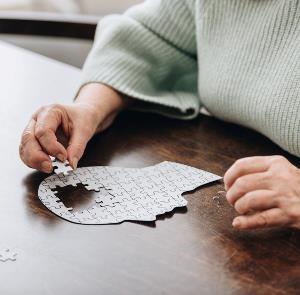Dignified care in all stages of dementia
Dementia has three phases, in which someone has less and less control of his or her daily actions. Each new phase requires more intensive help maintaining personal care and hygiene. And each phase requires more help from caregivers.
Do you know what characterizes each of the three phases of dementia? Find out the characteristics of each stage and see how you can offer the best help in each phase.
Early stage of dementia
In the early stage of dementia, people close to the patient may start noticing small changes in behavior or capacities, such as forgetting recent events. In the beginning, dementia is easy to hide and the signs are easy to overlook.
Common symptoms of the early stage of dementia include:
- General forgetfulness
- Losing track of time
- Getting lost in familiar places
- Difficulty remembering words, repeating oneself more often, or getting lost in the middle of a story
- Irritated more quickly than usual
- Difficulty making decisions or making plans
But be aware, symptoms of early stage dementia are often mistaken with symptoms of other diseases, such as depression, UTI’s, or with side effects of medications.
This is why it’s particularly important to go through thorough early diagnosis and diagnostics to rule out any other illness (or to be aware of what else could be causing symptoms to worsen).
What early stage dementia feels like:
The early stage feels like the ‘threatened’ stage. Because they feel threatened, people in this stage often respond with denial, hiding, anger, withdrawal , and gloom.
- Feeling endangered/threatened, because of the changes happening.
- Gradually feeling a sense of losing control and experiencing trouble with logical reasoning and planning ahead.
- Reading, writing and speaking starts to feel difficult
Tips for dignified care in early stage dementia
Early diagnosis is important to rule out any other illness, or to be aware of what other factors, such as medications, could be causing symptoms to worsen.
- Maintain routines and daily activities: This is especially important for personal care routines, so there is no “overdue maintenance” later on.
- Communication: Avoid confrontation or “tests”. Don’t confront the dementia patient with what they don’t remember. This can cause shame and anger. Rather, make them feel pleasant and helped instead of feeling they are forgetting things.
- Physical functions and self-reliance: Most things can still be done independently, but a helping hand can still be nice sometimes.
Middle stage of dementia
In the middle stage of dementia, the patient starts to forget more, repeats things, and may have trouble recognizing people. There is an increasing disorientation in time and place.
Common symptoms of the middle stage of dementia include:
- Becoming forgetful of recent events and names
- Quickly gets lost in unknown places, may start getting lost at home
- Increasing difficulty doing daily activities, reading, and having a conversation
- Increased need for help with personal care
- Experiences behavior changes, including wandering and repeated questioning
- Difficulty recognizing and using familiar objects
- May see and hear things that are not there
- Appearing confused, repeating things, forgetting the names of acquaintances
- Having trouble controlling their bladder and bowels
What middle stage dementia feels like:
The middle stage feels like the “lost” stage, and the symptoms are now clear to feel and see. It feels difficult to do daily activities and maintain a normal conversation.
- May feel safer at home and avoid going out – even to places that used to be familiar.
- Incontinence may appear, often as a result of an accident.
- Feeling lost and losing sense of independence because of an increased need for help with daily activities such as eating, washing, and dressing.
Tips for dignified care in the middle stage of dementia:
Accepting that the person with dementia now need guidance and help in daily activities, including personal care, makes it easier to provide dignified care in the middle stage of dementia.
- Maintain regular routines and familiar activities as much as possible. Try to keep sleep and bathroom habits to a regular schedule.
- Communication: Make eye contact and touch gently. Speak slowly, clearly, and in a comforting tone. Don’t ask questions that you know they don’t know the answer to. Remember that patients with dementia are still people with emotional needs for compliments and encouragement.
- Independence: While the patient has an increasing need for support in daily care, many in this phase also have a sense and need for independence. Don’t take over everything, but do it together. Or, provide tools, guidance, and routines for making care routines more manageable.
- Incontinence is increasingly common in the middle phase.
- Maintain regular and gentle skin care and personal hygiene. Wash-without-water products and bed bathing are good options. Treat and prevent dry skin with skin care ointment.
Late stage of dementia
In the late stage of dementia, the patient is decreasingly aware of who they are and who is around them and interacts less with their surroundings.
Common symptoms of the late stage of dementia include:
- Becoming unaware and confused of time, place, and people, having difficulty recognizing relatives and friends.
- Having difficulty walking, becomes less and less mobile, sometimes the body seems to freeze.
- Unable to recognize everyday objects, repeating the same sentences or sounds over and over again.
- Behavior changes, getting upset, angry, or aggressive.
- Likely to be completely incontinent (urine and bowel).
- Dangerous and unusual behavior such as running away, getting lost, forgetting to turn off the stove, going outside in their pajamas.
- Distorted sense of reality and perception, sometimes with hallucinations.
What late stage dementia feels like
The late stage of dementia feels like the “hidden” stage. All sense of time, space and place has disappeared. The body still registers basic needs such as warmth, hunger, and pain. Moving is now difficult, and eventually the patient will be dependent on a wheelchair or completely bedridden. While the voice may still work, it is increasingly difficult to understand. Basic needs and emotions are eventually communicated via repeated movements and sounds.
It is not uncommon to be completely incontinent. It may also become difficult to chew and swallow food.
Dignified care for late stage of dementia
In the late stage of dementia, help and support is now needed in most daily activities. The best help is to provide comfort for the patient while taking care of the essentials (hygiene, hunger, pain, warmth).
As a family caregiver, one way to provide comfort is to follow the flow and pace of the patient. When a person with dementia feels comfortable and relaxed, they may suddenly say clear things or sing a song.
- Communication: Make regular contact and touch someone gently. Try to hold a dialogue where possible, not a monologue.
- Incontinence: In the late stage, the patient is generally completely incontinent. Be sure to use the right incontinence products and take care of the skin to prevent painful skin conditions
- Personal hygiene: Showering every day may not be necessary, especially if there is a lot of resistance. Bed bathing may be an option. Watch and listen to what the patient is comfortable with.
Tips and knowledge for finding your way around dementia in practice .Read more about dementia in practice
Incontinence and other toileting challenges are common in people with dementia, but also an often overseen aspect of dementia care. Read more about Incontinence and dementia






